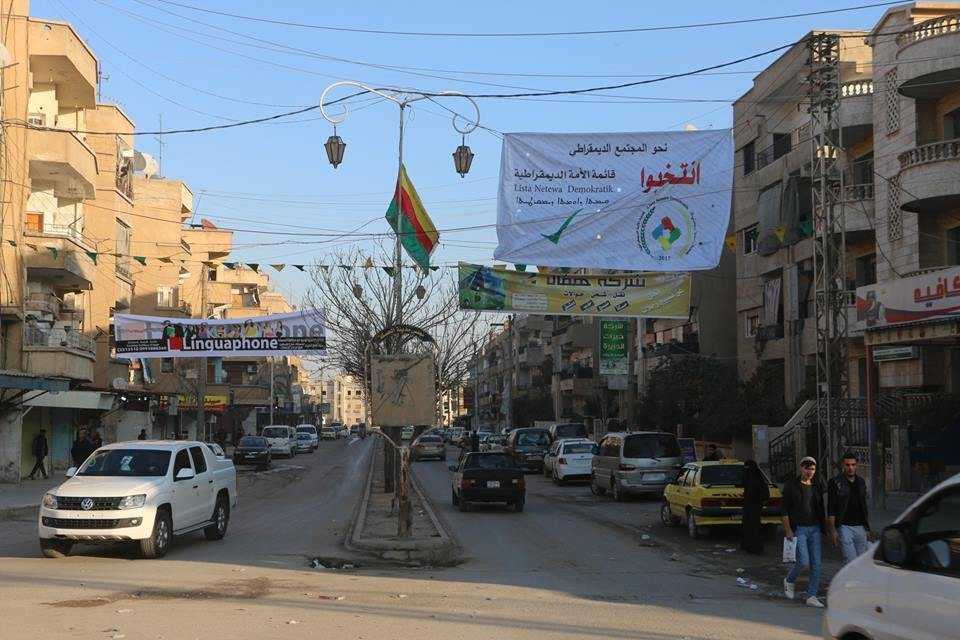Politicians from Iraqi Kurdistan in northern Syria to observe local elections
AMMAN: A delegation from Iraqi Kurdistan arrived in northern Syria’s […]
30 November 2017
AMMAN: A delegation from Iraqi Kurdistan arrived in northern Syria’s Kurdish-led territories this week to observe local elections slated for Friday, in what may signal warming relations between the two politically divided regions.
Parliamentarians with the ruling political party in Iraqi Kurdistan—the Kurdistan Democratic Party (KDP)—are among 13 Kurdish observers who arrived in northern Syria this week to monitor upcoming elections. The observers also include Kurdish members of Turkey’s left-wing Peoples’ Democratic Party (HDP).
“We want this to be a step towards political détente,” Fouzah Youssef, co-president of the Democratic Federation of Northern Syria’s Executive Committee, told Syria Direct on Thursday. “Kurdish unity is very important in light of events in the region, and there is a need to recognize the political will that has emerged from the constituents of northern Syria, led by the Kurdish people.”
On Friday, residents of the Democratic Federation of Northern Syria (DFNS)—de facto autonomous, Kurdish-majority territories also known as Rojava—go to the polls to vote for municipal representatives and local council members.
It is the second stage of a three-part election process underway in the northern territories. Voters selected representatives in local communes on September 22. A third and final round of voting early next year will select parliamentary representatives for the region’s highest office: the People’s Democratic Council.

In the coming elections, DFNS residents are to vote for electoral lists rather than individual candidates. The most prominent list—expected to win handily in the elections—is the Democratic Nation List, which includes the Kurdish Democratic Union Party (PYD) that currently leads the Self-Administration governing the territories.
“We hope that the democratic process in Rojava succeeds,” Aminah Zakri, a parliamentarian with the ruling party in Iraqi Kurdistan and leader of the observer delegation, told local radio station ARTA FM on Thursday. “We are here as parliamentarians in Kurdistan, and not as party members.”
Historically, the leading parties in Syrian and Iraqi Kurdistan have been ideologically and politically opposed. In northern Syria, the Kurdish Democratic Union Party (PYD) under the ideological leadership of Abdullah Ocalan historically espoused Marxist-Leninist ideals until embracing democratic confederalism in recent years.
Iraq’s Kurdistan Regional Government (KRG), led by the KDP, is staunchly nationalist, relatively pro-West and previously maintained strong ties with Turkey, a country that views Syria’s leading Kurdish PYD party as a terrorist organization.
In Syria, supporters of pro-KDP political parties accuse the PYD of political repression, and vice versa in Iraq.
The main Kurdish opposition party in Syria’s northern territories—the KDP-aligned Kurdish National Council (KNC)—is boycotting the three-part elections, which it considers illegitimate.
“Towards a democratic society,” reads an election sign in Hasakah city on Thursday. Photo by Shivan Hussein for Syria Direct.
Executive Committee Co-president Youssef called the KNC boycott “irresponsible” on Thursday.
Speaking to ARTA FM, KDP parliamentarian Aminah Zakri said the Iraqi Kurdish delegation would meet with parties boycotting the elections “to learn why they have not participated.”
Syria Direct reached out to the KNC party headquarters in the Syrian city of Qamishli for comment on Thursday, but did not receive a response.
The apparent thaw in relations between Iraqi and Syrian Kurdish political leadership comes after Iraq’s Kurdistan Regional Government held an independence referendum this summer in defiance of warnings from Baghdad and Ankara. The referendum passed, with most voters supporting independence.
In response, Turkey threatened to shut down an oil pipeline between Iraqi Kurdistan and Turkey, and Baghdad closed airspace over the region and seized large swathes of disputed territory in Iraq.
The KDP’s ties to Turkey are a longstanding sore point between the neighboring Kurdish regions. With the strength of those ties waning, a door could be opened for closer relations with the Syrian PYD.
“This participation may be a step towards warmer relations between the administrations in northern Syria and Iraqi Kurdistan,” Noor e-Din Omar, a Beirut-based Kurdish political writer originally from the northeastern Syrian city of Qamishli, told Syria Direct on Thursday.
“This participation underscores the credibility of the organizers of these elections,” said Omar, who supports the PYD-led Self-Administration that is holding the elections.
But for Hussein Hassan, a 40-year-old resident of Syria’s northeastern Hasakah city, the elections themselves “don’t mean anything.”
“These are not elections,” said Hussein.
“It’s a reshuffling of the seats among some of the existing powers in Rojava.”
With reporting by Shivan Hussein.
This report is part of Syria Direct’s month-long coverage of northern, Kurdish-held Syria in partnership with the Konrad Adenauer Foundation and reporters on the ground in Syria. Read our primer here.









